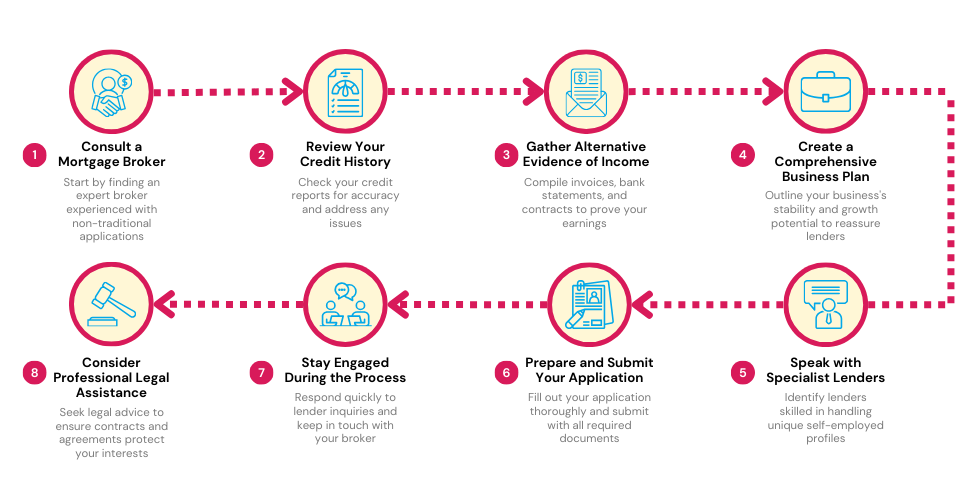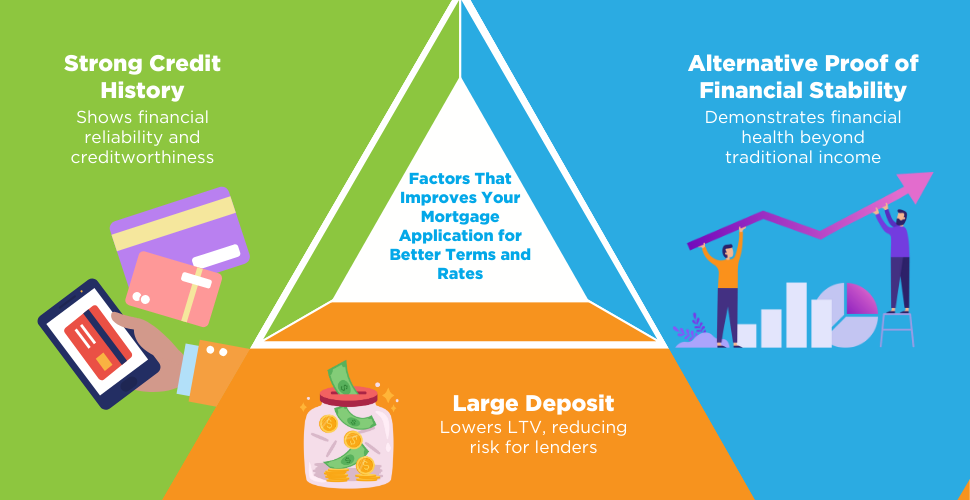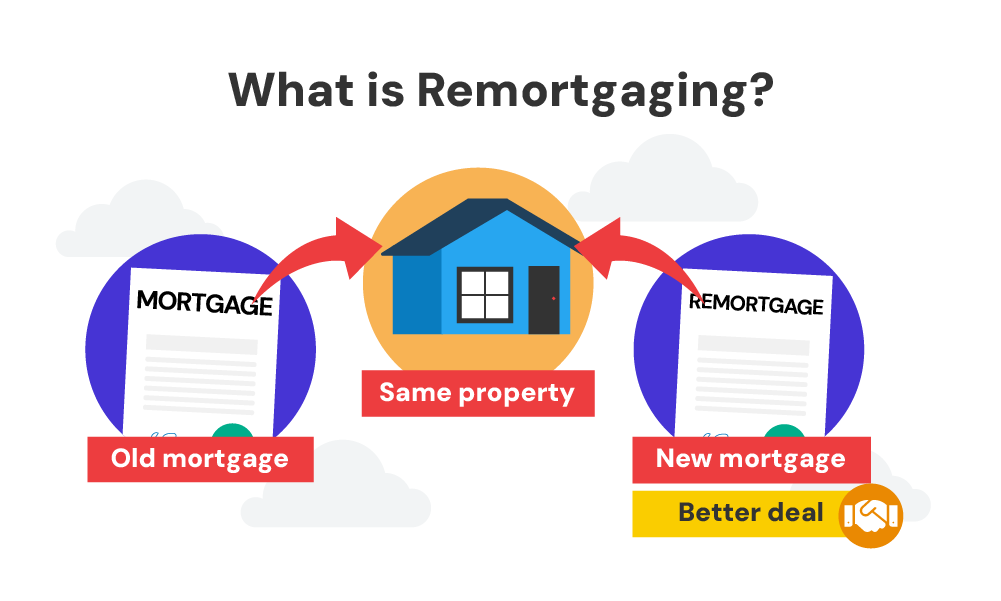- Is it Possible to Get a Self-Employed Mortgage With No Accounts?
- How to Apply for Self-Employed Mortgages Without Accounts?
- What Types of Evidence Lenders Might Request?
- Do You Need a Larger Deposit for a Self-Employed Mortgage Without Accounts?
- Which Lenders Will Consider My Mortgage Application Without Accounts?
- Remortgaging Without Accounts: Is It Possible?
- Key Takeaways
- The Bottom Line
Getting Self-Employed Mortgages Without Accounts

Are you self-employed and eager to step onto the property ladder, but feel held back by not having years of accounts?
It’s a common concern, but there’s good news: obtaining a mortgage without accounts is entirely possible. This scenario may seem challenging, but with the right approach, it can be quite straightforward.
In this article, we’ll break down the process of securing a self-employed mortgage without accounts, providing clear and practical information.
From the supporting evidence required to how a broker can assist you, everything will be laid out in an easy-to-understand manner. The dream of owning your home need not be out of reach just because you’re self-employed.
Is it Possible to Get a Self-Employed Mortgage With No Accounts?
Yes, it is. While it’s common for many lenders to request three years’ worth of accounts, that’s not the only path to securing a mortgage if you’re self-employed.
If you’re new to self-employment or perhaps working as a freelancer without an accountant, there are still doors open to you.
Several lenders are willing to consider alternative evidence of your income, recognising that the traditional way isn’t the only way.
Whether it’s through bank statements or other financial records, the goal is to demonstrate that you can responsibly handle the loan.
So rest assured, not having accounts doesn’t have to be a barrier to owning your home. It’s all about finding the right approach and the right lender to suit your unique situation.
How to Apply for Self-Employed Mortgages Without Accounts?
Securing a mortgage without accounts might feel like unfamiliar territory, but it’s far from impossible.
The first wise step is to consult with a mortgage broker who’s skilled in arranging mortgages in such situations. They’re the experts and know the ropes. Here’s a detailed step-by-step process:
1. Consult a Mortgage Broker
Start by speaking with a good mortgage broker experienced in handling cases without accounts. They can guide you through the process and help identify lenders who may be a good fit.
2. Review Your Credit History
Obtain a copy of your credit reports from major credit bureaus. You can get a free copy from various credit reference agencies such as Experian, Equifax, and TransUnion. A clean credit history can positively influence lenders.
3. Gather Alternative Evidence of Income
If you don’t have accounts, compile other documents that can verify your income. These might include:
- Invoices and receipts
- Bank statements showing consistent income
- Contracts for existing or upcoming work
4. Create a Comprehensive Business Plan
If applicable, prepare a well-structured business plan and income projections. This can demonstrate to lenders your business’s stability and growth potential.
5. Speak with Specialist Lenders
Work with your broker to identify and approach lenders who have experience with self-employed applicants without accounts. They’ll understand your unique situation and might be more flexible.
6. Prepare and Submit Your Application
With the assistance of your broker, complete the application and submit all required documents. Ensure everything is accurate to avoid delays.
7. Stay Engaged During the Process
Respond promptly to any requests for additional information and keep in touch with your broker to understand how your application is progressing.
8. Consider Professional Legal Assistance
If needed, seek legal guidance to ensure that all agreements and contracts meet your needs and are in your best interest.

What Types of Evidence Lenders Might Request?
When seeking a self-employed mortgage without accounts, lenders will need a way to grasp your financial situation. They’ll require evidence that illustrates your recent, current, and possible future earnings.
For sole traders who handle their tax returns, SA302 tax calculations can serve as proof of income over the past few years.
For those new to trading and without accounts or tax returns, there are still options. Lenders may request various documents that can demonstrate income and trading records. These might include:
- Invoices and receipts
- Bank statements
- Contracts for existing or upcoming work
- A well-thought-out business plan
- Certified projections for your finances
Do You Need a Larger Deposit for a Self-Employed Mortgage Without Accounts?
The question of needing a larger deposit isn’t a simple yes or no. It’s a bit more nuanced and can vary among lenders.
Being self-employed without accounts might be perceived as a higher risk by some lenders, so a larger deposit could be a way to lessen that risk
A bigger deposit can have several advantages. It lowers the Loan to Value ratio (LTV), which often strengthens a mortgage application regardless of your employment status.
A lower LTV might even lead to more options and possibly better rates.
But it’s not just about the deposit. Your credit history can be equally important.
If you’ve managed to maintain a strong credit history without missed payments or defaults, it could be a significant plus. It may help balance out any perceived risk due to your self-employment status without accounts.
In a nutshell, while a bigger deposit might help, it’s not the only factor.
A combination of a reasonable deposit and a solid credit history can work in your favour, opening up opportunities and making the path to homeownership smoother even without traditional accounts.

Which Lenders Will Consider My Mortgage Application Without Accounts?
As discussed earlier, having no accounts might narrow down your options. But it doesn’t mean the door is closed.
With the right guidance, you can still find specialist lenders who are more adaptable to unique situations like yours.
For example, some lenders might evaluate applications from those who have been self-employed for less than two years. Given that, there’s evidence of a consistent income level in a similar line of work.
Others may accept 12 months of trading history with proof of income, although they might set a limit on the Loan to Value ratio (LTV).
It’s fair to warn that these specific circumstances may lead to slightly higher interest rates initially.
The reasoning is quite simple: anything that adds to the lender’s risk usually has a cost.
But fear not, as you build equity and establish a longer self-employment history, you’ll likely find yourself in a position to remortgage on more favourable terms.
Remortgaging Without Accounts: Is It Possible?
Yes.
Remortgaging when self-employed without accounts might sound a bit challenging, but it follows a similar pattern to acquiring a new mortgage.
Lenders are primarily concerned with your ability to keep up with the repayments. They’ll be examining evidence of your income along with a solid credit record to back that up.
Interestingly, remortgaging could be somewhat simpler than getting a new mortgage if you’ve already built up a good amount of equity in your home.
A substantial amount of equity lowers your LTV, widening your options and making more lenders available to you.
In short, while it might seem a tad complex, remortgaging without traditional accounts is possible.
If you’ve demonstrated responsibility with your finances and have built up equity in your property, lenders may be more inclined to consider your application.
It’s all about painting a clear picture of financial stability, even without the standard paperwork.

Key Takeaways
- Securing a mortgage without accounts is possible for self-employed individuals, with several lenders willing to consider alternative income evidence.
- Consulting a skilled mortgage broker is a wise step, guiding you through the process and helping identify lenders that match your situation.
- Your credit history and alternative evidence like invoices, bank statements, and business plans can be crucial in demonstrating your financial capability.
- While a bigger deposit might be beneficial, it’s not the sole factor; a solid credit history can also work in your favour.
- Remortgaging without traditional accounts is possible, and having good equity in your home can make the process even more accessible.
The Bottom Line
Getting a mortgage as a self-employed individual without accounts is more than possible. Knowing how to present alternative income evidence and maintain a clean credit history sets the stage for success.
Your financial situation is unique, and with professional guidance, the process becomes clear and straightforward.
Working with an experienced mortgage broker makes all the difference. They’ll provide personalised support, identify the right lender, and assist you every step of the way.
Whether it’s understanding borrowing limits or deposit requirements, they’ll ensure everything is well-explained.
Ready to move forward? Fill out this quick form, and we’ll link you with a skilled broker who understands your needs.
This free, no-obligation consultation is your first step towards successful homeownership as a self-employed individual without accounts.
Get Matched With Your Dream Mortgage Advisor...

Frequently asked questions
Do I need a bank account to get a mortgage?
Yes, a bank account is essential for obtaining a mortgage. Lenders will examine your recent bank statements to confirm your income and financial obligations, ensuring that the mortgage is within your means. Plus, having a bank account allows them to collect your monthly repayments.
Is it possible to get a mortgage without proof of income?
Getting a mortgage without proof of income is a no-go. Lenders must act responsibly, and this involves verifying your earnings.
That said, not all lenders will insist on traditional forms of income proof like accounts, particularly if you’re self-employed. Some may accept alternatives such as SA302 tax calculations or other unique forms of evidence that show you can handle the mortgage. It’s all about connecting with the right lender who understands your particular situation.
What things can stop you from getting a mortgage?
Things that can stop you from getting a self-employed mortgage without accounts include a lack of alternative income evidence, a poor credit history, the absence of a detailed business plan, and failure to consult with a specialist mortgage broker who understands unique financial situations.
What are some of the reasons why self-employed people might not have business accounts?
The reasons for not having any self-employment accounts may include being newly self-employed, operating as a freelancer without an accountant, handling financial matters informally, or not having reached the point in the business where formal accounts are typically established.
How long do I need to be self-employed to be considered a good mortgage risk?
Typically, lenders prefer self-employed individuals to have at least two to three years of trading history for a mortgage. However, some lenders may consider less, especially if you can provide other strong evidence of income stability.
This article has been fact checked
This article was created, checked, and verified by the expert team at Money Saving Guru. Trust us, you’re in good hands.




